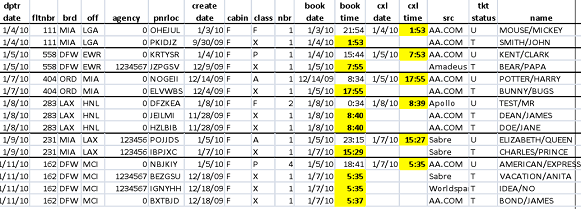American’s ‘revenue integrity’ team was created in 2008. They search out abusive booking practices by passengers which take up seats that could otherwise be sold by the airline, and that work to get seats cheaper than the airline intends to sell them. Here’s a presentation by that team from 2010 (.pdf).
American is not alone in this, and the things that are flags for American are also generally flags for others as well — to greater or lesser degrees.
American searches for – and cancels – duplicate bookings. I recently put an itinerary on hold that overlapped with something I already had ticketed. My plan was to call, cancel the existing itinerary and use it as a credit towards the new ticket. By the time I called, the new itinerary I had held was cancelled.
Whatever the reason, unused reservations are a lost revenue opportunity
They look for duplicate bookings even when not under the same name. Specific flags are:
- Multiple bookings on a single flight from the same booking source
- Multiple online bookings from a single IP address
They also look for fake bookings in premium cabins made increase upgrade chances.
The most prominent scheme is to book duplicate Premium cabin bookings under false names in a separate reservation(s) from the real coach booking.
When within the upgrade window, the offender will cancel the full fare bookings , hoping to open up upgrade inventory, and quickly book the upgrade in the real reservation You can detect Premium Cabin Upgrade abuse by developing a report to match potentially abusive reservations by the relationship between the time of a cancellation and the time of a booking on the same flight
For example, find a reservation with a cancellation that occurred at 1:00 p.m. in a full First or Business class inventory and another reservation made in an upgrade class of service at 1:02 p.m. on the exact same flight
From there, you can manually review the two reservations to determine if the cancellation and new booking were made by the same booking source
Check for matches, or connections, between agency IATA, phone number, IP address

Interesting stuff!
(HT: JonNYC)
- You can join the 30,000+ people who see these deals and analysis every day — sign up to receive posts by email (just one e-mail per day) or subscribe to the RSS feed. It’s free. You can also follow me on Twitter for the latest deals. Don’t miss out!


Can’t click the link to the presentation, Gary.
@dave – i had to go through HT:JonNYC link
By duplicate bookings, you don’t mean nested bookings, right? You’re talking about a true second booking that leaves on the same day as something already ticketed, for example?
Actually American has been aggressive in this area for many years. In the late 80’s/early 90’s, before ID checks were routine, Robert Crandall told his troops to check ID on tickets, and to tell customers they were committing fraud and confiscate the tickets if correct ID was not provided. And, in the late 90’s, when I tried to change a ticket for a colleague to save $250 on the fare, the AA airport ticket agent acted as if I was trying to defraud them. I found AA’s practices so distasteful that I refused to fly them for 15 years, and steered many other travelers away from them. (I’ve since mellowed out.)
Link to pdf:
http://www.arccorp.com/gfpf/2010_day3_2.pdf
I get a 404 (Not Found) on the link http://www.arccorp.com/gfpf/2010_day3_2.pdf
Does anyone have a copy they could post somewhere or send me?